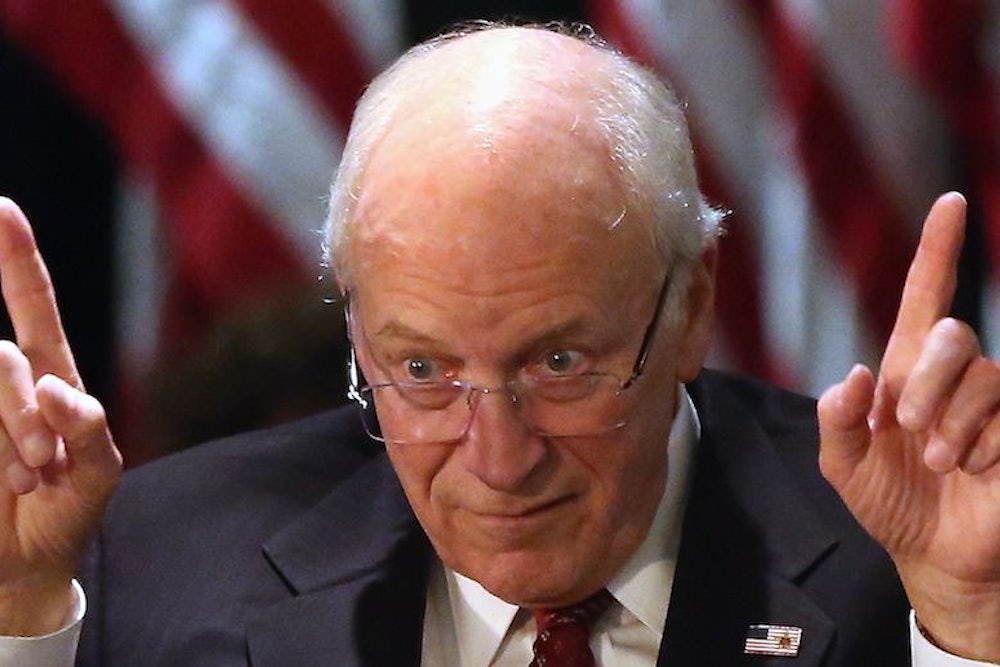On Monday, Commentary editor John Podhoretz released the eight-minute tribute/parody video to Dick Cheney, which the magazine showed earlier this month at an honorary roast of the former vice president. The video, written by David Burge, whose @iowahawkblog Twitter feed reliably mixes conservatism and humor, is okay. There are a lot of jokes about Cheney’s love of guns, though none about the time he shot a friend in the face. Nor were there “war crimes” jokes—our loss I guess! Commentary paterfamilias Norman Podhoretz steals the show—seriously, the guy’s got timing—as a folk-club impresario who gave young Dick a chance: “I figured, feh, what the hell, let him sing.”
The video pretends to be a “Behind the Music” re-telling of the life and times of Dick Cheney. But apparently the reference to the classic VH1 program, which I was all ready to say ended its run in 2005 but actually is still on the air, was too much for some of the Twitterati: “BREAKING: Young BuzzFeed staffers not only don’t remember the 60s, they have no idea what ‘Behind the Music’ was #getoffmylawn,” tweeted Podhoretz.
But he buried the lede. “Behind the Music,” which reached the heights of its popularity and cultural prominence roughly a decade ago, was actually by far the most up-to-date reference in the eight-minute tribute, which stands as nothing so much as impeccable evidence that, even today, neoconservatism remains committed to a bizarrely rearguard action against the excesses of the 1960s.
The video’s conceit is that Cheney is Bob Dylan: a Midwestern strummer turned Greenwich Village folkie turned gone-electric superstar. (Lynne Cheney is cast as Joan Baez.) Except it only tells a small part of the Dylan story, tellingly ending in 1968, when Dick and Lynne drop out and start an “anti-Communist ashram” (there is then a 30-second epilogue that brings us up to date)—the equivalent to Dylan maybe-getting into a motorcycle crash and receding from public life in 1966.
The allusions are similarly dated. There is reference to “the anti-Communist generation.” There are Photoshopped pictures of Cheney with Andy Warhol, Cheney with the Beatles, Cheney with Irving Kristol. “In October of ’66,” the narrator tells us, “he recorded what would become their anthem: ‘Like an I.F. Stone.’” Then we hear the chorus:
How does it feel?
How does it feel?
To be on the phone,
To a Moscow zone,
Like an I.F. Stone.
There is a reference to the “'68 Monterrey Neocon Festival,” the aforementioned ashram, and then Richard Nixon signing Cheney “to play his ’69 inauguration comeback special.”
A video in 2013 whose most biting joke about liberals is how I.F. Stone was too nice toward the Soviet Union is really a fascinating psychological document—a great companion piece to all those Weekly Standard covers about hippies. Like all origin stories, the neoconservatives’ is immensely appealing: it was the mid-‘60s, liberalism was maybe becoming a little unmoored, the professoriate and the rest of the “adversary culture” required some humbling, and a bunch of smart writers in New York began a project to put the country back on the right track. But there is something almost neurotic about an intellectual movement so stuck in its glorious past. (Honestly, it put me in mind of how I constantly remind other football fans how great Washington’s football team was in the ‘80s.)
The newest song in the video’s soundtrack is a Dylan track from 1974’s Planet Waves. Naturally, it’s “Forever Young.” But political movements, like everything else, don’t get to stay forever young. They grow old and evolve; and if they spend all their time wallowing in their past in denial of their present, they die or become discredited. If this video were the only symptom of neoconservatives’ long, strange nostalgia trip, that would be one thing. But in both foreign and domestic policies, they retain a simplified worldview, better suited to a world in which the Soviet Union existed and George McGovern was the Democratic standard-bearer. As Dick Cheney once sang, “Your old road’s rapidly fadin’. Please get out of the new one if you can’t lend a hand.”
